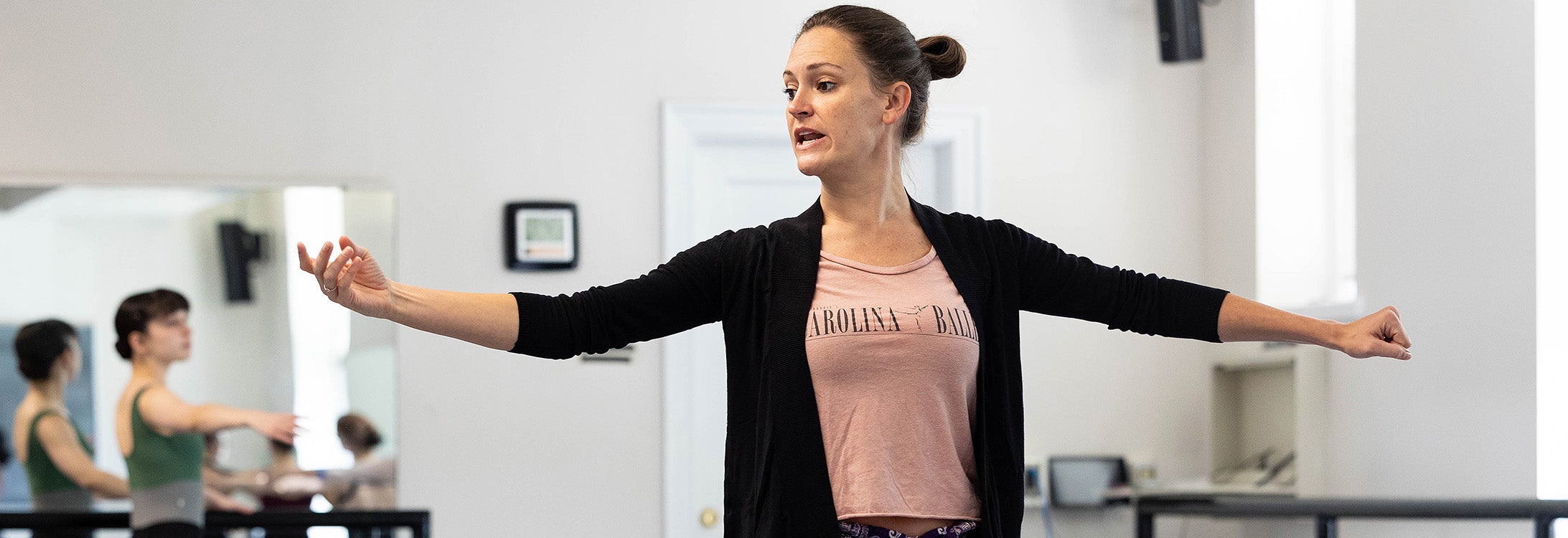WINDOW TO THE WORLD
Kenya welcomes ECU dance students studying, teaching abroad
A group of East Carolina University dance students and professors traveled this summer to Kenya, where — immersed in local culture — they learned a variety of African dance styles, taught children’s dance classes, and saw wildlife on a weekend safari.
The experience capped a virtual spring semester exchange between ECU’s School of Theatre and Dance and Dance Centre Kenya. The students designed choreography in the spring that they performed together in Nairobi in May.
The trip was possible through VESA (virtual exchange and study abroad), a program developed by the ECU Office of Global Affairs and funded by a U.S. Department of State IDEAS grant. This is one of three VESA projects in ECU’s College of Fine Arts and Communication promoting a new international educational model for students with virtual classroom exchanges in the spring and travel in summer.
INTERNATIONAL EDUCATION
Two other departments in the ECU College of Fine Arts and Communication are involved in VESA (virtual exchange and study abroad) projects that were altered because of the pandemic. Matt Egan in art (printmaking) and Christine Gustafson in music (flute) had to cancel study abroad plans. However, the grant has been extended to continue activity in the upcoming academic year, said Jami Leibowitz, associate director of ECU’s Office of Global Affairs, director of Global Academic Initiatives and chair of Global Partners in Education.
Egan arranged guest lectures and opportunities for ECU students to virtually engage with students at the Higher College of Technology Women’s Campus in Abu Dhabi, United Arab Emirates. Students discussed and demonstrated art techniques and examined art entrepreneurship, particularly for women, Leibowitz said. While ECU art students will not be traveling abroad, ECU hopes to have students from Abu Dhabi on campus in the fall if visas can be secured.
For the music course, Gustafson is working with a colleague at the University of Taipei in Taiwan. Planning is underway again for next year, Leibowitz said.
“The VESA model enables students to form relationships and share ideas with peers virtually for an extended period of time and then have the opportunity to travel to that country to work with those peers in person,” said Jessica Teague, assistant professor of dance at ECU. “It is truly incredible to have the virtual ‘head start’ for forming relationships and acclimating to each other’s cultures before traveling to that location. It was interesting to see how for some students it was literally like opening a window onto another world and then allowing them to step through it.”
This spring, ECU students danced in Messick studio, connecting virtually with Cooper Rust and Antony Nduva of Dance Centre Kenya. Rust then traveled to Greenville in April to teach in-person classes.
The opportunity began about two years ago when Teague and Rust collaborated to teach virtual classes when COVID-19 halted in-person instruction. Having known each other since they were children, they thought virtual dance might help overcome loneliness felt across the world during isolation.
“Something kickstarted in the pandemic as a way to keep students engaged has grown into something much bigger,” Teague said.
The VESA project helped take the partnership to another level.
“It was wonderful to hear that due to the relationships the students built during the virtual exchange portion, they were able to have deep, meaningful interactions with their student colleagues and friends once they were on the ground in Kenya,” said Jami Leibowitz, associate director of ECU’s Office of Global Affairs, director of Global Academic Initiatives and chair of Global Partners in Education.
“This is somewhat of a rarity for study abroad programs,” she said. “While of course beneficial, most summer study abroad programs are insular. You are there with a cohort of ECU students, being led by an ECU professor with a very structured agenda. Actually engaging with the local community is often a missed opportunity. By building those relationships beforehand and requiring the students to work on projects together, that local engagement is guaranteed. We are ecstatic about how this turned out and acknowledge that a large part of the success is due to the passion and dedication of our instructor here, Jessica Teague, and her counterparts at Dance Centre Kenya, Cooper Rust and Antony Nduva.”
Rust hosted the ECU students and faculty in her home that she shares with her 14 children. The work of Dance Centre Kenya and Rust’s leadership have been pitched to Netflix for a series called “Leap.”
“During the two weeks, I watched friendships bloom between our students and the Kenyan students,” Teague said. “Cooking and tidying up together, sharing stories and of course dancing! The Kenyan students often played music at the house, and we would all end up dancing together — it was an instant party most nights. We also rode to the dance studios and took dance classes together. Some ECU students helped the younger Kenyan students with their homework and played guitar or games like pingpong or Jenga.”
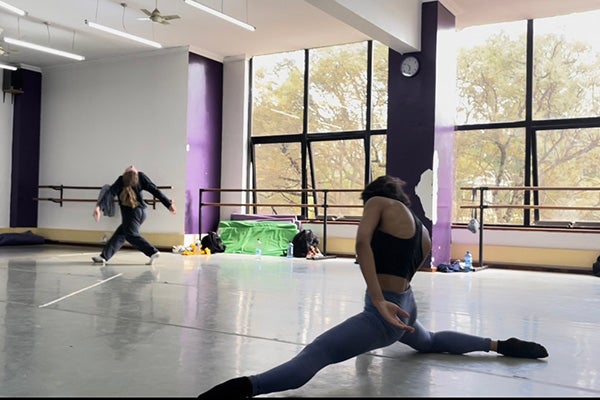
ECU students Elizabeth Bailey and Melody Martinez dance in a master class in Kenya. (Contributed photo)
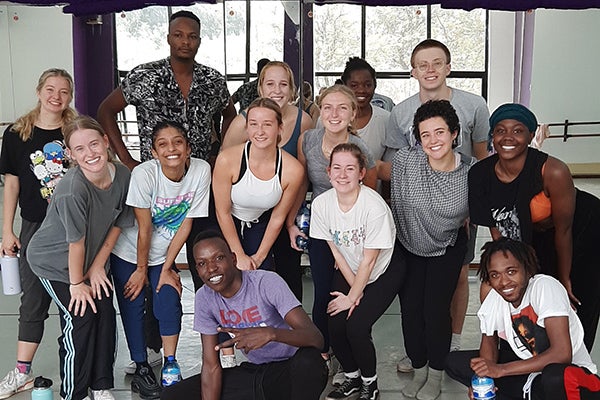
ECU students break after a master class at Dance Centre Kenya. (Contributed photo)
Each day began with training sessions and master classes. “All of our instructors were from Kenya or the neighboring countries,” Teague said. “We studied traditional African dance, many varieties of hip-hop, Afro pop, African dance hall, ballet and contemporary dance. We also had lessons in African drumming.”
In the afternoon, students were divided into small groups and paired with faculty to teach at public schools or one of Dance Centre Kenya’s sites, gaining valuable teaching experience. While there, ECU students and faculty taught in five schools through the Artists for Africa outreach program, which provides instruction in music, dance, theater or visual arts once a week.
“Some of the schools we worked in had very little resources, and others located within Nairobi slums had even fewer,” Teague said. “There is no other art instruction included in the curriculum at these particular schools, so the program provides a creative outlet that the students really enjoy.”
Adrian Jones, a rising ECU sophomore from Wilmington, said seeing the smiles on the kids’ faces was a highlight of the trip, although maintaining their attention spans and communication were a challenge.
“Although most people in Kenya speak English as well as their first language, Swahili, the students at the outreach schools were not as well-versed in English since they came from a lower-income background,” Jones said. “Unfortunately, I did not know Swahili well enough to communicate with them effectively, but thankfully, their year-round teacher was able to translate.”
Jones also had the opportunity to meet his adopted elephant, Kindani. “My aunt and uncle have visited the Sheldrick Wildlife Trust many times and have gifted me an elephant adoption for Christmas the past 12 years,” he said. “I have had three elephants during that time: Sites, Tusuja and Kindani. The former two have been reintegrated into the wild, but I had the pleasure of meeting Kindani in person! Getting to pet her made it all the better!”
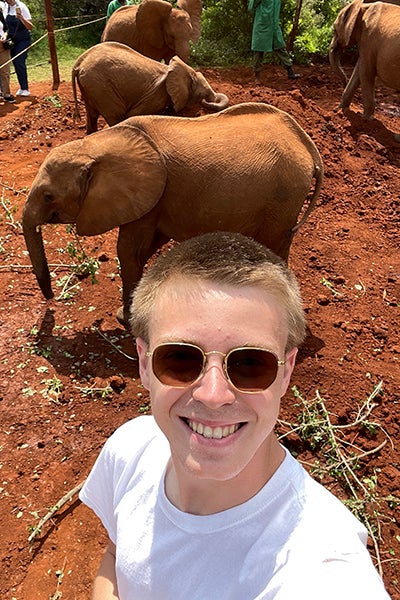
ECU student Adrian Jones meets his adopted elephant, Kindani. (Contributed photo)
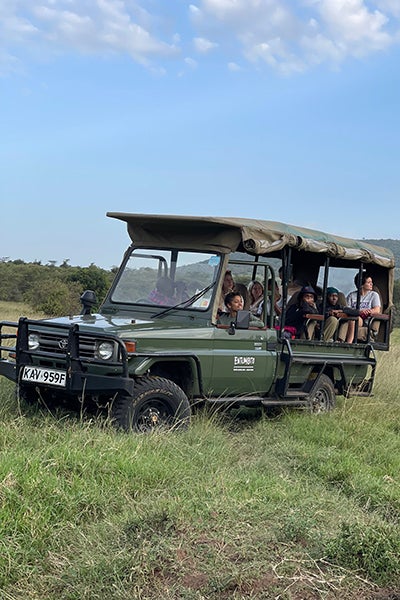
ECU students go on safari during their study abroad trip to Kenya. (Contributed photo)
In the Maasai Mara National Reserve, the group stayed in a tented resort and took various safaris to see African wildlife in its natural habitat. “The community welcomed us with open arms by sharing tribal songs in a traditional circle, supplying a shuka, a bright-colored cloth worn around their bodies, a tour of their homes and an explanation of their lifestyle to us,” said rising ECU senior Melody Martinez of Hickory. “They encouraged us to take pictures and videos, and to ask questions about the tribe throughout our time there.”
During the week, Jones and Martinez enjoyed learning from amazing instructors and choreographers.
“These classes challenged me in areas I would only improve on with international training,” Martinez said. “A class that was incredibly special to me was choreographer and teacher, Maylene. She began the class with an introduction about her and her teaching style. We went across the floor, did center work, then began the final phrase. To start, Maylene performed the combination for the entire class. She explained the importance of your intention during the phrase, then taught the material. Maylene challenged me to let my emotions be what drives my movements.”
Jones said the trip helped him become a more versatile dancer by learning styles of dance that are not normally offered on a large scale in America. “It was fascinating to see how people live on the other side of the world, and it was also interesting that many stereotypes that Americans have about Africa are not necessarily true,” he said. “As I continue forward in life, I hope to retain my worldly knowledge and appreciate all people for whom they are, regardless of their background.”
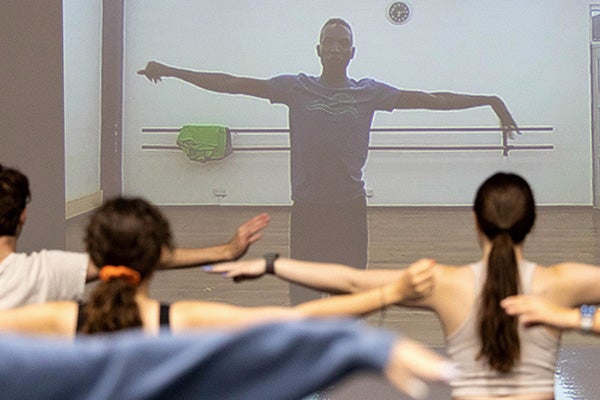
Antony Sesi teaches ECU students virtually from Kenya. (Photo by Rhett Butler)
A site affiliated with Dance Centre Kenya is Project Elimu in Kibera, one of Africa’s largest slums. The center is a safe place where children can participate in free dance and music classes and have a warm meal. Most Kibera residents live in extreme poverty and lack access to basic services like running water, electricity and medical care. “The dance center is a refuge where children and especially young women can escape from the difficulties of life and focus on developing their own talents and dreams,” Teague said.
Founder Mike Wamaya invited ECU students to participate in one of Project Elimu’s large, yearly performances, where they danced with local students.
“Seeing the humble living conditions inside the slums and learning about some of the harsh challenges children face growing up there was incredibly eye-opening for our students,” Teague said. “Some of the Kenyan students we were staying with at Cooper’s house grew up in Kibera and began their dance training at Project Elimu.”
The trip was the first time that some of the ECU students traveled abroad. They learned the processes involved with passing through checkpoints on three continents, passports, COVID testing and documentation, and multiple border crossings as well as long layovers on a journey that took more than 30 hours each way, Teague said.
“The whole experience of engaging with peers and community leaders from different regions of Africa has hopefully encouraged students to be open to new ways of collaborating on an international level and to be inspired by and actively pursue opportunities and connections with global peers,” she said. “I believe being exposed to how different people in Kenya live and work, and the multiple layers of Kenyan society — including issues surrounding poverty, distribution of resources, health, conservation, and education — is an incredible learning experience for our students. Observing first-hand how customs from other cultures and countries compare or differ from ours always provides perspective that prepares students for the future.”
Studying abroad is important as professional work and careers in creative sectors like dance are becoming more internationally focused, Teague said.
“This trip was as much about individual development and experience as it was about service work and learning,” she said. “We were not just observers sightseeing and viewing the country from the sidelines. We were actively engaged with the community at all times, and students were required to put in hours of community service work each day. This made it a very unique experience with many challenges as well as long-lasting rewards.”
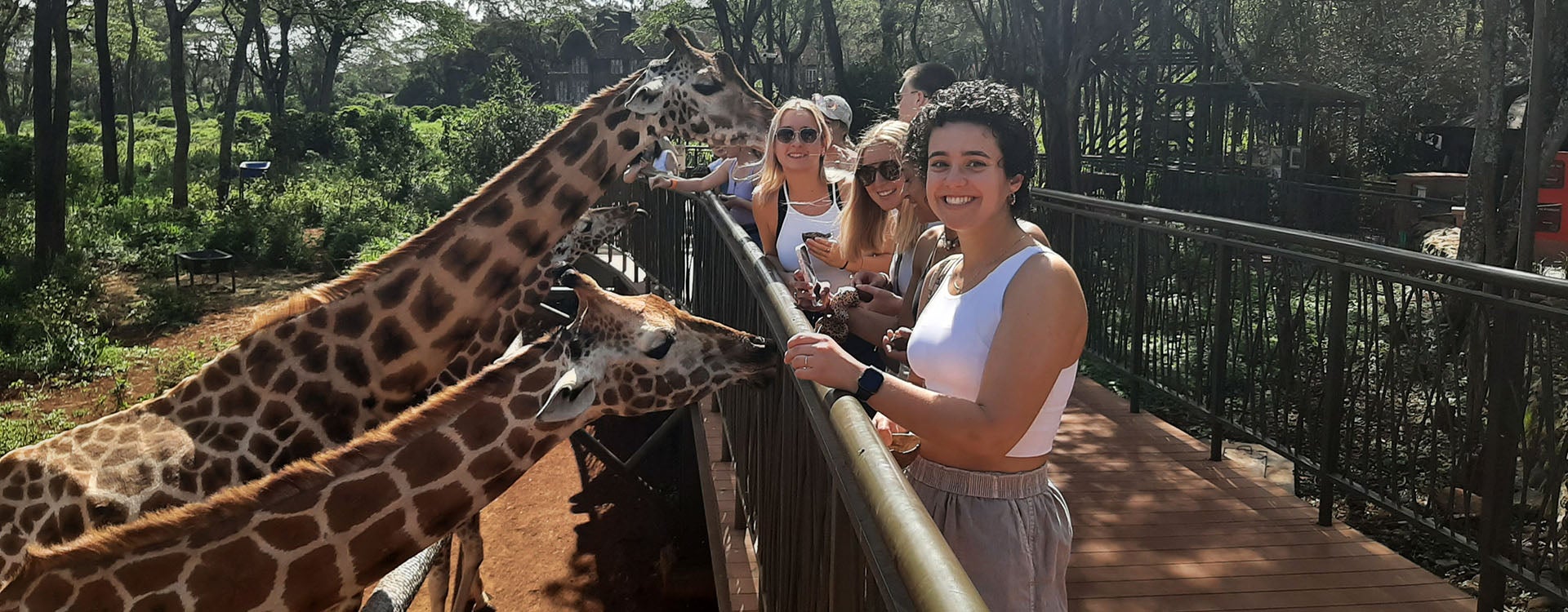
ECU students and staff visit a giraffe center. (Contributed photo)
